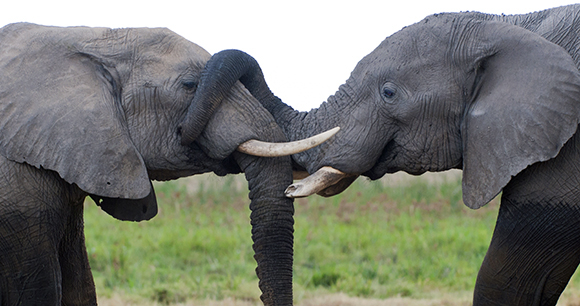
Vancouver, Canada—The Animal Welfare Institute (AWI) joined 95 Canadian and international conservationists, scientists, politicians and animal welfare organizations in a letter sent to the Canadian government this week urging the closure of Canada’s domestic elephant ivory trade. Accompanying the letter was an online petition that garnered over 120,000 signatures—and continues to gather hundreds more each day—from concerned citizens wanting to see an end to ivory sales in Canada. Elephanatics, a Canadian elephant advocacy organization, is leading this #IvoryFreeCanada campaign effort.
The letter asks the Canadian government to ban all domestic trade of elephant ivory and make its import, export and re-export illegal. In addition to AWI, signatory organizations include Humane Society International, the International Fund for Animal Welfare (IFAW), Born Free, the African Wildlife Foundation, the Amboseli Trust for Elephants, Big Life Foundation and World Elephant Society. Dr. Richard Leakey, noted paleoanthropologist and conservationist, and Dr. Joyce Poole, prominent elephant researcher and scientist, also signed the letter.
“Without restrictions on ivory trade, elephants—once abundant in many Asian and African countries—will disappear from the planet,” said Nadia Adawi, AWI executive director. “All domestic ivory markets need to cease to ensure the long-term conservation of elephants. The Canadian government has a responsibility to help protect this iconic animal and needs to take action.”
Every year, approximately 20,000 African elephants are killed for their tusks. An estimated 12 million elephants lived in Africa in the early 1900s. Today, there are fewer than 400,000—a 97 percent decline over the past century. Asian elephants are even more endangered, with only 30,000 to 40,000 left. Conservationists and scientists agree that the world’s largest land animal will disappear in the wild within our lifetime if demand for ivory is not reduced.
“The Canadian government has a unique opportunity to play a leadership role in elephant conservation by closing its domestic trade in elephant ivory, thereby eliminating all legal loopholes,” said Fran Duthie, president of Elephanatics. “Ignoring this opportunity would put Canada at odds with the growing international movement to save elephants from extinction.” At the last meeting of the IUCN World Conservation Congress, it was overwhelmingly decided that globally, governments must close their legal domestic markets for elephant ivory as a matter of urgency. Canada was one of only four countries to vote against it.
Several countries have changed their laws to protect elephants. In June 2016, the United States imposed a near total ban on domestic ivory sales. Two months later, France became the first European country to ban its domestic trade. China shut down its domestic ivory trade at the end of 2017. The United Kingdom recently solicited public feedback on a proposed domestic ban and 85 percent of the public supported it. In January 2018, Hong Kong’s legislature voted in favor of banning all ivory sales by 2021. Taiwan is expected to announce a ban on domestic ivory sales starting in 2020. Singapore is considering a full ban.
To support the #IvoryFreeCanada campaign, please consider signing the Change.org petition.
Amey Owen, (202) 446-2128, [email protected]